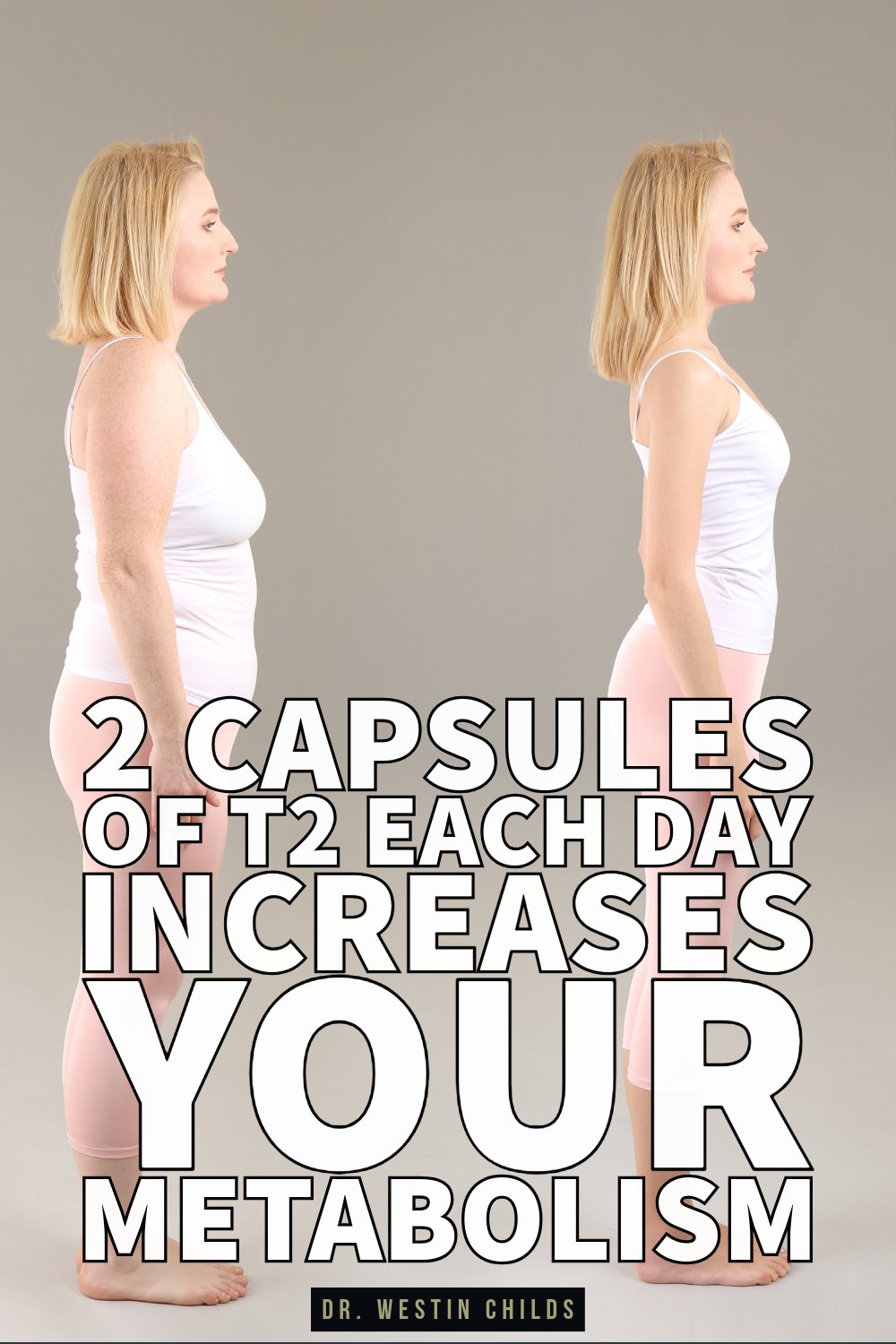When it comes to your weight, nothing is more important than managing your basal metabolic rate (1).
This rate controls and regulates how many calories you burn at rest making it the single most important metric for weight control.
The higher your basal metabolic rate is, the easier it is to lose weight and the easier it is to stay lean.
So if obtaining an ideal body composition is your goal, the question you should be asking yourself is this:
“How can I easily improve my basal metabolic rate?”
And that’s a question that I can help you with.
Here’s why:
The Easiest Way To Manage Your Basal Metabolic Rate
When it comes to managing this number, there’s a lever that you can pull that can make things a whole lot easier for you.
And that lever is your thyroid hormones.
Thyroid hormones, especially T3 and T2, are the PRIMARY regulators of your basal metabolic rate (2) and, by far, the most powerful thyroid hormones.
Current estimates suggest that your thyroid is responsible for about 40-60% of your metabolism.
And while we don’t have an exact number or percentage, and it’s likely that it varies from person to person, we know that it’s one of the most important metrics.
So if you want to more easily lose weight and maintain your body composition, thyroid hormones MUST be at the top of your mind.
When it comes to thyroid hormones, T3 is definitely the strongest overall but T2 plays a more important role in regulating the metabolism for 3 important reasons:
DOWNLOAD FREE RESOURCES
Foods to Avoid if you Have Thyroid Problems:
I’ve found that these 10 foods cause the most problems for thyroid patients. Learn which foods you should avoid if you have thyroid disease of any type.
The Complete List of Thyroid Lab tests:
The list includes optimal ranges, normal ranges, and the complete list of tests you need to diagnose and manage thyroid disease correctly!
#1. It helps your body activate brown fat.
Unlike white fat, brown fat is actually good if you want to lose weight because it helps your body burn fat and increases heat production (also known as thermogenesis).
Right now we don’t have a lot of T2 studies in humans but plenty of animal studies have shown that T2-treated mice see a browning of their white fat in as little as 10 weeks of daily T2 use (3).
This effect is so strong that T2 use in animals has been shown to counteract the negative effects of a high-fat diet.
Don’t be alarmed that you aren’t seeing a lot of human studies that are using T2 because it’s just now reaching increased attention.
Studies always start with animals and then extend to humans (4) and it will be the same in this case.
Even though there aren’t many studies on humans, we can extrapolate other existing data that suggests that T2 benefits humans in a similar way:
The first is with the use of Natural Desiccated Thyroid medications like Armour Thyroid.
These medications have long been held in high regard by many thyroid patients for their ability to help with weight loss beyond regular medications like levothyroxine.
Part of this must be attributed to the content of T2.
Yes, they contain T3 but there seems to be something special about T2 because patients who are using a combination of T4 and T3 medications don’t see the exact same results as equal dosing of Armour thyroid or equivalents (5).
And second, my own anecdotal experience with the use of T2 suggests it can help with weight loss as well.
My own T2 supplement has now been used by over 10,000 people and we are definitely seeing that T2 use has an impact on weight and metabolism.
#2. It increases mitochondrial energy production.
Mitochondria can be found in both brown fat and in your muscles where they provide a positive benefit on your weight and metabolism.
The more energy your mitochondria can produce, the more calories you will burn at rest and during exercise.
Increasing mitochondrial energy production is another easy way to enhance your metabolism and increase your basal metabolic rate and T2 thyroid hormone has been shown to do just that (6).
And #3. It provides a balancing effect on T3 and T4 levels (which means it’s beneficial for people WITH and WITHOUT thyroid disease).
Taking additional T2 can stabilize thyroid hormone conversion which means you maintain higher thyroid hormone levels in your body for longer periods of time.
In the normal physiologic state, your body starts with T4 and eventually breaks it down iodine by iodine until it creates T1.
But each thyroid hormone has a slightly different action and function.
T4, for instance, is really just a storage hormone for the creation of T3 and rT3.
T3, on the other hand, is a very metabolically active thyroid hormone.
T2 appears to be one of the most important thyroid hormones for regulating metabolism.
And T1, as far as we know, doesn’t have any function.
If you are trying to capitalize on thyroid physiology to enhance your weight loss efforts, then you’d want to maintain high levels of the thyroid hormones that we know have important functions like T4, T3, and T2.
But as you might have guessed, doing this is easier said than done.
And that’s because the same things that cause weight gain are the same things that negatively impact thyroid hormone metabolism.

Things like inflammation, eating processed foods, not sleeping enough, and stress, all preferentially cause your body to create fewer active thyroid hormones.
Instead of creating T3, your body will create reverse T3 which blocks the function of T3 leading to a decreased metabolism.
This slows down thyroid conversion and causes cellular hypothyroidism in the process.
Being overweight all by itself is enough to impact this conversion process and lead to thyroid dysfunction.
Which is why weight gain and thyroid dysfunction are related.
Weight gain can cause low thyroid function and low thyroid function can cause weight gain.
So, yes, it may very well be the case that your thyroid is responsible for your weight even though your lab tests may look normal.
But let’s put that aside for just a second to say that T2 has a positive impact on thyroid hormone metabolism and may stabilize your T4 and T3 levels.
Regardless of existing thyroid disease, we know that a functioning thyroid gland is important for the regulation of your metabolism.
And both those with thyroid disease and those without can benefit from T2 use by virtue of its stabilizing effects on T4 and T3.
Using T2 For Obesity
This is why T2 is such an interesting treatment for obesity in both people who have thyroid problems and those who don’t.
But more interesting than that, is the fact that you don’t need a high dose of T2 to obtain these benefits.
Relatively small doses of T2, those that are very well tolerated, can have a big impact on your fat cells and other thyroid hormones.
One human study showed that taking T2 was enough to increase resting metabolic rate and resulted in a 4% reduction in body weight over a period of several weeks (7).
This was done in people with NORMAL thyroid function, by the way, not in people who have existing hypothyroidism.
This implies that T2 supplementation may be a useful treatment for all types of obesity, regardless of thyroid status.
I’ve long been a proponent of using T2 for patients with existing thyroid dysfunction but I’ve been hesitant to recommend T2 in those who are overweight but with ‘normal’ thyroid levels.
But my mind is changing…
Is T2 safe for people who are overweight without thyroid problems?
The direction the data is pointing is yes, as long as the dose is not too high (more on that in just a minute).
T2 is Easier to Get Compared to Other Thyroid Hormones
Another really interesting point about T2 is the fact that it’s the ONLY thyroid hormone that is available over the counter which means you don’t need a prescription to get it.
Thyroid hormones like T3 and T4 BOTH require a prescription from your doctor but that’s not the case with T2.
For all of these reasons, I think T2 is probably the single most effective way to manipulate your basal metabolic rate and thyroid hormone system without running the risk of causing problems.
How to Use T2 Safely
If you want to take advantage of the benefits of T2 for weight loss here are a few things to consider:
Let’s start with dosing:
The few human studies that exist suggest that dosing of T2 should not exceed 300 mcg per day (8).
This threshold is important because if you stay under it, you won’t see any negative changes to your thyroid function lab tests if you were to check them.
This is critical because it implies that T2 is having an effect on your cells without changing your thyroid lab tests or putting you into a state of hyperthyroidism.
Thyroid medications like T3 are often abused for their weight loss potential but their abuse leads to temporary states of excess thyroid hormone.
Taking T2 in the right range will augment your metabolic potential without increasing your risk of hyperthyroidism and subsequent problems.
It may be tempting to try and increase your dose of T2 to get results faster but this tactic should be avoided.
That’s because higher doses of T2 can definitely cause problems and have been shown to cause cardiac enlargement (9).
T2 does have a weak affinity for the T3 receptor but it can start to cause hyperthyroid symptoms when dosing exceeds 300 mcg per day.
Beyond existing studies, my own experience suggests that dosing in the 100 mcg to 200 mcg per day range is ideal for both thyroid support and metabolic support.
It provides you enough of a dose to see a benefit while keeping you clear from the higher end of the range which may cause problems.
Using T2 As a Supplement
Next, you need to think about the form of T2:
The most biologically active form of T2 is 3,5 diiodo-l-thyronine.
So if you want to supplement with T2, make sure you get this form and not some other weaker metabolite.
And, finally, the duration of therapy:
It takes a minimum of 6 weeks of daily use of any thyroid hormone before it reaches a steady state in your serum.
So this is not some lose weight quick scheme, it’s something you need to plan to do for the long haul.
Like any thyroid hormone that you may be taking, the benefits really just start to take effect at the 6-week mark but may take several months to fully realize.
For this reason, and because it’s just the best way to approach weight loss, you should never just take T2 by itself.
Its use should always be accompanied by diet and exercise, and I would also add intermittent fasting of some sort to that list.
That’s because T2 and these treatments have a synergistic effect with one another.
Combining T2 with these therapies will make them even more effective and will continually improve your thyroid function overall.
Should You Take T2?
I think it depends on your situation.
For the treatment of hypothyroidism, I know the answer is clear: yes, you should give it a trial.
For weight loss, I think the answer is a little more nuanced.
I would definitely consider the use of T2 thyroid hormone for weight loss to still be in its early infancy and even in the experimental phase.
So if you are somebody who doesn’t like the idea of being an early adopter, then this is probably not the best option for you.
For full disclosure, there are some people who recommend AGAINST the use of T2 by suggesting that it hasn’t been well studied.
And while it is true that it hasn’t been as studied as other treatments, it should come as no surprise that some people recommend against its use.
The same people who recommend avoiding it are the same people who recommend only using T4 thyroid medication and testing the TSH, so you can take that for what it is.
After reviewing the existing studies, it appears that T2 use for weight loss is a very promising strategy and I would be happy to argue for its use (along with T3) in place of other more potentially harmful treatments like GLP-1 agonists.
I don’t know how you can suggest that a GLP-1 agonist like Wegovy is safer than a bio-identical thyroid hormone.
It’s less about risk and more about personal preference.
If you are someone that prefers to use natural hormones to help bring your body and metabolism back into balance then I would say T2 is a great option.
In addition, if you’ve tried a lot of other weight loss medications or treatments without success, then you may want to consider it as well.
As I mentioned previously, 3,5 diiodo-l-thyronine is considered to be a bio-identical hormone which means it looks identical to the same T2 that your body produces in a healthy state.
The source is considered synthetic because it’s manufactured in a lab, but whether or not a hormone is beneficial depends far more on whether it’s bioidentical or not as opposed to its source.
As always, do your research first because no one cares more about your body than you do!
And by the way, T2 isn’t the only supplement that can help with thyroid weight loss.
You can see a list of other great options here.
Scientific References
#1. ncbi.nlm.nih.gov/pmc/articles/PMC6893862/
#2. ncbi.nlm.nih.gov/books/NBK500006/
#3. ncbi.nlm.nih.gov/pmc/articles/PMC6468521/
#4. translational-medicine.biomedcentral.com/articles/10.1186/s12967-019-1976-2
#5. ncbi.nlm.nih.gov/pmc/articles/PMC8089975/
#6. ncbi.nlm.nih.gov/pmc/articles/PMC5854997/
#7. pubmed.ncbi.nlm.nih.gov/22217997/
#8. pubmed.ncbi.nlm.nih.gov/22217997/
#9. ncbi.nlm.nih.gov/pmc/articles/PMC4272398/









